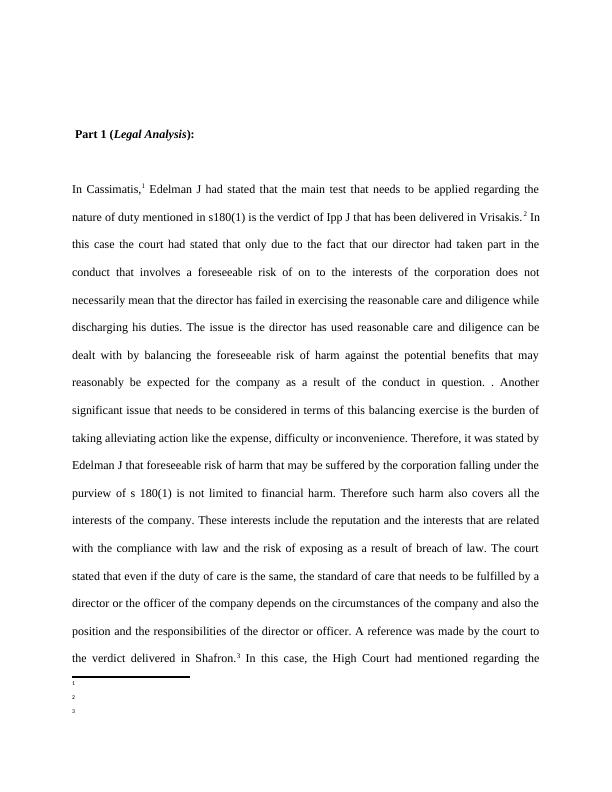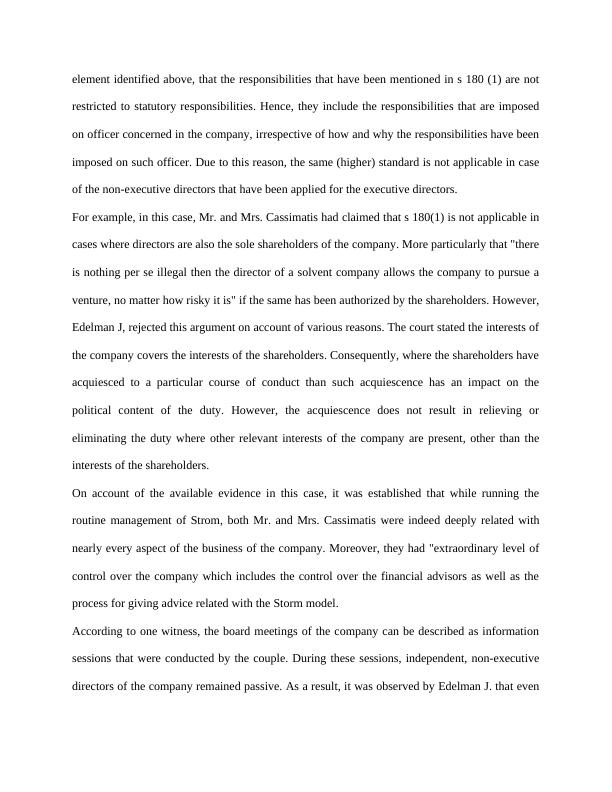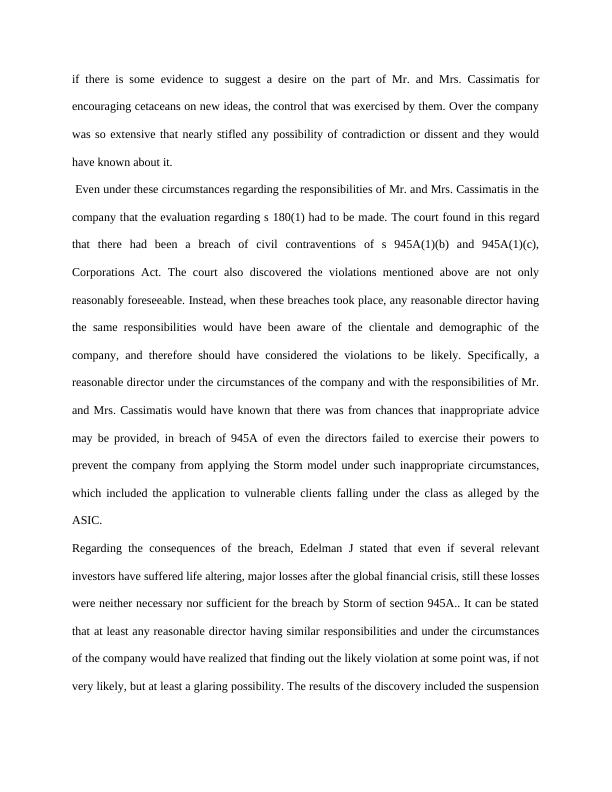Analysis of Cassimatis Case: Duty of Directors under s180(1) of Corporations Act
Added on 2023-06-03
9 Pages2898 Words170 Views
Part 1 (Legal Analysis):
In Cassimatis,1 Edelman J had stated that the main test that needs to be applied regarding the
nature of duty mentioned in s180(1) is the verdict of Ipp J that has been delivered in Vrisakis.2 In
this case the court had stated that only due to the fact that our director had taken part in the
conduct that involves a foreseeable risk of on to the interests of the corporation does not
necessarily mean that the director has failed in exercising the reasonable care and diligence while
discharging his duties. The issue is the director has used reasonable care and diligence can be
dealt with by balancing the foreseeable risk of harm against the potential benefits that may
reasonably be expected for the company as a result of the conduct in question. . Another
significant issue that needs to be considered in terms of this balancing exercise is the burden of
taking alleviating action like the expense, difficulty or inconvenience. Therefore, it was stated by
Edelman J that foreseeable risk of harm that may be suffered by the corporation falling under the
purview of s 180(1) is not limited to financial harm. Therefore such harm also covers all the
interests of the company. These interests include the reputation and the interests that are related
with the compliance with law and the risk of exposing as a result of breach of law. The court
stated that even if the duty of care is the same, the standard of care that needs to be fulfilled by a
director or the officer of the company depends on the circumstances of the company and also the
position and the responsibilities of the director or officer. A reference was made by the court to
the verdict delivered in Shafron.3 In this case, the High Court had mentioned regarding the
1
2
3
In Cassimatis,1 Edelman J had stated that the main test that needs to be applied regarding the
nature of duty mentioned in s180(1) is the verdict of Ipp J that has been delivered in Vrisakis.2 In
this case the court had stated that only due to the fact that our director had taken part in the
conduct that involves a foreseeable risk of on to the interests of the corporation does not
necessarily mean that the director has failed in exercising the reasonable care and diligence while
discharging his duties. The issue is the director has used reasonable care and diligence can be
dealt with by balancing the foreseeable risk of harm against the potential benefits that may
reasonably be expected for the company as a result of the conduct in question. . Another
significant issue that needs to be considered in terms of this balancing exercise is the burden of
taking alleviating action like the expense, difficulty or inconvenience. Therefore, it was stated by
Edelman J that foreseeable risk of harm that may be suffered by the corporation falling under the
purview of s 180(1) is not limited to financial harm. Therefore such harm also covers all the
interests of the company. These interests include the reputation and the interests that are related
with the compliance with law and the risk of exposing as a result of breach of law. The court
stated that even if the duty of care is the same, the standard of care that needs to be fulfilled by a
director or the officer of the company depends on the circumstances of the company and also the
position and the responsibilities of the director or officer. A reference was made by the court to
the verdict delivered in Shafron.3 In this case, the High Court had mentioned regarding the
1
2
3

element identified above, that the responsibilities that have been mentioned in s 180 (1) are not
restricted to statutory responsibilities. Hence, they include the responsibilities that are imposed
on officer concerned in the company, irrespective of how and why the responsibilities have been
imposed on such officer. Due to this reason, the same (higher) standard is not applicable in case
of the non-executive directors that have been applied for the executive directors.
For example, in this case, Mr. and Mrs. Cassimatis had claimed that s 180(1) is not applicable in
cases where directors are also the sole shareholders of the company. More particularly that "there
is nothing per se illegal then the director of a solvent company allows the company to pursue a
venture, no matter how risky it is" if the same has been authorized by the shareholders. However,
Edelman J, rejected this argument on account of various reasons. The court stated the interests of
the company covers the interests of the shareholders. Consequently, where the shareholders have
acquiesced to a particular course of conduct than such acquiescence has an impact on the
political content of the duty. However, the acquiescence does not result in relieving or
eliminating the duty where other relevant interests of the company are present, other than the
interests of the shareholders.
On account of the available evidence in this case, it was established that while running the
routine management of Strom, both Mr. and Mrs. Cassimatis were indeed deeply related with
nearly every aspect of the business of the company. Moreover, they had "extraordinary level of
control over the company which includes the control over the financial advisors as well as the
process for giving advice related with the Storm model.
According to one witness, the board meetings of the company can be described as information
sessions that were conducted by the couple. During these sessions, independent, non-executive
directors of the company remained passive. As a result, it was observed by Edelman J. that even
restricted to statutory responsibilities. Hence, they include the responsibilities that are imposed
on officer concerned in the company, irrespective of how and why the responsibilities have been
imposed on such officer. Due to this reason, the same (higher) standard is not applicable in case
of the non-executive directors that have been applied for the executive directors.
For example, in this case, Mr. and Mrs. Cassimatis had claimed that s 180(1) is not applicable in
cases where directors are also the sole shareholders of the company. More particularly that "there
is nothing per se illegal then the director of a solvent company allows the company to pursue a
venture, no matter how risky it is" if the same has been authorized by the shareholders. However,
Edelman J, rejected this argument on account of various reasons. The court stated the interests of
the company covers the interests of the shareholders. Consequently, where the shareholders have
acquiesced to a particular course of conduct than such acquiescence has an impact on the
political content of the duty. However, the acquiescence does not result in relieving or
eliminating the duty where other relevant interests of the company are present, other than the
interests of the shareholders.
On account of the available evidence in this case, it was established that while running the
routine management of Strom, both Mr. and Mrs. Cassimatis were indeed deeply related with
nearly every aspect of the business of the company. Moreover, they had "extraordinary level of
control over the company which includes the control over the financial advisors as well as the
process for giving advice related with the Storm model.
According to one witness, the board meetings of the company can be described as information
sessions that were conducted by the couple. During these sessions, independent, non-executive
directors of the company remained passive. As a result, it was observed by Edelman J. that even

if there is some evidence to suggest a desire on the part of Mr. and Mrs. Cassimatis for
encouraging cetaceans on new ideas, the control that was exercised by them. Over the company
was so extensive that nearly stifled any possibility of contradiction or dissent and they would
have known about it.
Even under these circumstances regarding the responsibilities of Mr. and Mrs. Cassimatis in the
company that the evaluation regarding s 180(1) had to be made. The court found in this regard
that there had been a breach of civil contraventions of s 945A(1)(b) and 945A(1)(c),
Corporations Act. The court also discovered the violations mentioned above are not only
reasonably foreseeable. Instead, when these breaches took place, any reasonable director having
the same responsibilities would have been aware of the clientale and demographic of the
company, and therefore should have considered the violations to be likely. Specifically, a
reasonable director under the circumstances of the company and with the responsibilities of Mr.
and Mrs. Cassimatis would have known that there was from chances that inappropriate advice
may be provided, in breach of 945A of even the directors failed to exercise their powers to
prevent the company from applying the Storm model under such inappropriate circumstances,
which included the application to vulnerable clients falling under the class as alleged by the
ASIC.
Regarding the consequences of the breach, Edelman J stated that even if several relevant
investors have suffered life altering, major losses after the global financial crisis, still these losses
were neither necessary nor sufficient for the breach by Storm of section 945A.. It can be stated
that at least any reasonable director having similar responsibilities and under the circumstances
of the company would have realized that finding out the likely violation at some point was, if not
very likely, but at least a glaring possibility. The results of the discovery included the suspension
encouraging cetaceans on new ideas, the control that was exercised by them. Over the company
was so extensive that nearly stifled any possibility of contradiction or dissent and they would
have known about it.
Even under these circumstances regarding the responsibilities of Mr. and Mrs. Cassimatis in the
company that the evaluation regarding s 180(1) had to be made. The court found in this regard
that there had been a breach of civil contraventions of s 945A(1)(b) and 945A(1)(c),
Corporations Act. The court also discovered the violations mentioned above are not only
reasonably foreseeable. Instead, when these breaches took place, any reasonable director having
the same responsibilities would have been aware of the clientale and demographic of the
company, and therefore should have considered the violations to be likely. Specifically, a
reasonable director under the circumstances of the company and with the responsibilities of Mr.
and Mrs. Cassimatis would have known that there was from chances that inappropriate advice
may be provided, in breach of 945A of even the directors failed to exercise their powers to
prevent the company from applying the Storm model under such inappropriate circumstances,
which included the application to vulnerable clients falling under the class as alleged by the
ASIC.
Regarding the consequences of the breach, Edelman J stated that even if several relevant
investors have suffered life altering, major losses after the global financial crisis, still these losses
were neither necessary nor sufficient for the breach by Storm of section 945A.. It can be stated
that at least any reasonable director having similar responsibilities and under the circumstances
of the company would have realized that finding out the likely violation at some point was, if not
very likely, but at least a glaring possibility. The results of the discovery included the suspension

End of preview
Want to access all the pages? Upload your documents or become a member.
Related Documents
Analysis of Duty of Directors under s180(1) of Corporations Actlg...
|9
|3103
|208
ASIC v Cassimatis (No 8) - Breach of Director's Dutylg...
|10
|700
|374
Business Laws and Corporation ACT | Assignmentlg...
|9
|2220
|199
Breach of Directors Duties under Corporation Act 2001 - ASIC v Cassimatis (No. 8) [2016] FCA 1023lg...
|12
|657
|91
Storm Financial Limited Assignment Reportlg...
|8
|1744
|24
Corporation Law Assignment (Solved)lg...
|9
|2443
|268
